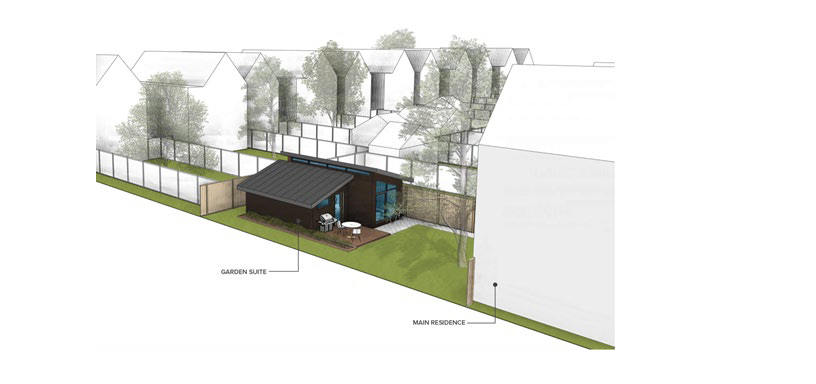
18 May A “New” Solution to Toronto’s Housing Affordability Crisis
By Jonathan Chan – University of Toronto Student & 8 80 Cities 2022/2023 Intern
Are Small-Scale housing initiatives the solution?

A garden suite render in Toronto. Credits: Lanescape.
Toronto has been dealing with an ongoing housing crisis that has worsened recently, leading to a hunt for solutions. The idea of small-scale housing, which seeks to increase density in lower-density neighbourhoods and offer more accessible housing choices for the general public, is one such solution that has emerged.
After the City of Vancouver legalized the construction of laneway and garden suites in single-family zones to address its housing affordability issue in the early 2010s, this idea acquired popularity in Canada. Small-scale housing has become a desirable option for those seeking more accessible and cheap housing due to Toronto’s rising housing costs and stagnant wages. Scholars described these unused lands in single-family zoning as an untapped resource for affordable housing development.
While small-scale housing is an enticing development for young couples and families, many challenges persist as cities are reluctant to roll out permits for small-scale housing production quickly. Toronto’s zoning bylaws and exclusionary zoning practices are part of the housing affordability issue, as such rigorous zoning practices limit the housing choices of Torontonians. Essentially creating the problem known as the “missing middle,” which incentives developers to construct condominiums, semi-detached, and detached housing which not only limits housing options but also resulted in expensive housing.
The City of Toronto recently legalized the construction of garden suites in single-family zoning areas in 2022; however, strict construction zoning regulations limit the total number of garden suites available to build and the overall usefulness of the plan to combat housing affordability issues. As a comparison building a garden suite currently costs around $300–400 Canadian dollars per square foot in Toronto, with a 2-bedroom suite costing roughly $350,000 with the City’s limit of 645 square feet max footprint.

A young couple living in a laneway suite in Vancouver. Credits: Nurmohamed
In contrast, the price of a condo with the same amount of bedrooms may cost anywhere from $750,000 to over $1,000,000. Making mall-scale housing an alternative for Torontonians wishing to enter the property market due to their cheaper cost. The produced small-scale housing can also contribute to the establishment of additional affordable housing alternatives, which will ease Toronto’s housing crisis.
The success Vancouver has had in implementing small-scale housing initiatives such as garden suites and laneway suites could be used to help Toronto. Vancouver has seen significant success since the program’s start in 2009, with the development of more than 2000 units. Vancouver has achieved this through loosening zoning regulations and offering incentives for the development of affordable housing. Despite Vancouver’s housing market being pricey, smaller-scale building projects have increased the supply of affordable housing.
While small-scale housing is intended to lessen the housing crisis in Toronto, we must understand that the housing crisis is not caused by a single but a mix of complex problems. The integration of small-scale housing in Toronto should be heavily focused on to ensure the housing stock produced remains affordable in the long term. Increasing the housing supply will do nothing to lessen the housing crisis; only by creating a long-term affordable housing supply will small-scale housing make a difference in Toronto’s housing market.


